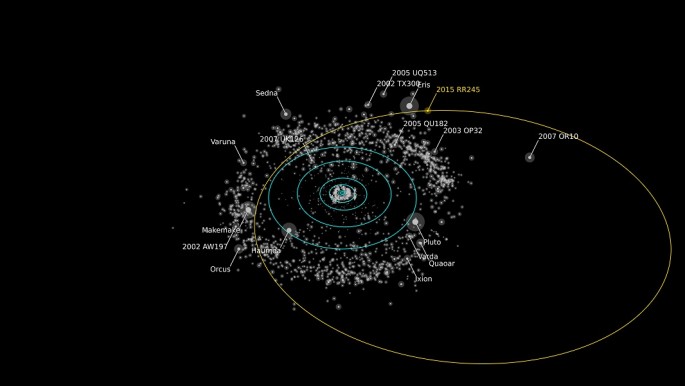A new dwarf planet has been discovered, located beyond the Kuiper Belt, which is composed of icy rocks and objects including Pluto. This new alien world known as 2015 RR245 is even more distant than Pluto and completes an orbit around the sun every 700 years. Pluto on the other hand completes its orbit in 248 years.
According to Michele Bannister from the University of Victoria, these icy worlds beyond the orbit of Neptune can provide crucial clues about how giant gas planets form and migrate outwards, away from the sun, revealing much about the evolution of the solar system. However, these icy planets are so tiny and faint, which can make a larger and brighter one more exciting, to be further studied in detail, she adds.
To date, the current size of this dwarf planet has not been determined yet, however scientists predict it is around 435 miles across. Pluto is the largest object in the Kuiper Belt, possessing a diameter of 1,474 miles.
Scientists first detected 2015 RR245 just this February, upon studying images obtained from the Canada-France-Hawaii Telescope located in Hawaii that were captured last September 2015 during the Outer Solar System Origins Survey.
This ongoing survey has already discovered more than 500 cosmic objects well beyond the orbit of Neptune however, 2015 RR245 is considered as the first dwarf planet that this survey has detected.
Dwarf planets are different from regular planets in our solar system like Earth since they are massive enough to be crushed and shaped by their own gravitational cores however, by definition of the International Astronomical Union in 2006, Pluto became a dwarf planet from this controversial reclassification.
To date, astronomers are still determining details about 2015 RR245 and its highly elliptical orbit, and believe that this new object is anywhere between 34 to 120 astronomical units from the sun. One astronomical unit is equals to the distance of the Earth from the sun, at 93 million miles.
Other dwarf planets found in the Kuiper Belt apart from Pluto are Eris, Haumea and Makemake, including several other objects that are not yet confirmed as dwarf planets.






















